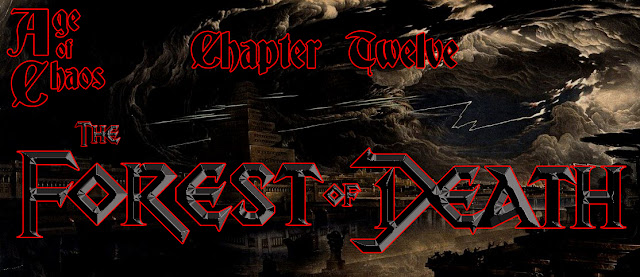Kurux – the black-crowned emperor of the greatest empire to rise
beneath the red sun – knelt in supplication here in his secret
chamber, high in the uttermost tower of his palace. Here he was
guarded, and warded, and alone save for that which he summoned, that
which he worshiped and feared in equal measure. He chanted the long,
slow sounds that were not words in any human speech. He called forth
with the power he possessed inside his mind, and the pool before him
began to roil, and rise.
As ever, he felt the presence before anything else. An
awareness that something immense and mighty focused its attention
upon him, and that he was no more than an insect creeping upon the
earth in comparison to the vast and terrible mind that now made
contact with him. The pool rippled, and then it began to pour
upwards, to make a form in the air that was not a shape that belonged
to human eyes, and indeed, even to look upon this pallid reflection
of the entity would blast and blacken the mind of anyone not gifted
with the power such as he possessed.
I answer your weak and puling call. I bend to your small will,
fragile though it may be. Give adulation unto my form, and speak.
The voice was a terrible thing, echoing through his mind, seeming to
shake the very walls. He believed that if it wished, it could blast
his city to the ground with a word. His god was a mighty, fearsome
god, and nothing else remained on the ruined earth that might contest
with it.
And yet, it had limitations. There
were boundaries upon its power, and that was why it needed him, and
tolerated him, and uplifted him. It gave him power, and he would
work its will. “Your
form is a thing of beauty unsurpassed,” Kurux said, his voice
shaking, for the summoning asked much from him. “Your will is
power and it commands me. I supplicate. I adore.”
Speak then. It said.
“I have gathered in all powers to
me,” Kurux said. “I have constructed all my war engines in
accordance with the old ways. I have pressed a generation of men
into my legions, broken them with a rod of iron, and made them into
killers above all. My empire is a machine of war, and now, in accord
with your will, I will unleash it.”




